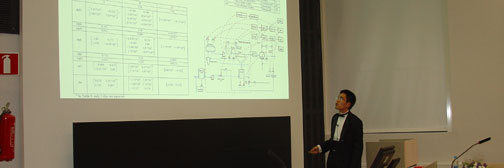| | Year 2000
Matti MuurinenSimulation study on the control of the bed and furnace of a fluidised bed boiler
Fluidised bed combustion has established itself as a method of solid fuel combustion, especially in small-scale plants. In view of process engineering, the good opportunities to use various kinds of fuels with a high efficiency can be regarded as one of the strengths of fluidised bed boilers. Also their simple structure can be regarded as another strength. Rapid and strong variations in the quality of fuels, however, put heavy demands on the control systems of the fluidised bed boiler. In order to be able to use fluidised bed boilers with as high efficiency as possible, also the control methods used in them shall be developed and various needs shall be taken into account, for example, in view of the optimisation of operating conditions.
The purpose of this study was to develop the automation of the furnace of a fluidised bed boiler to better take into account the quality variations of fuel and remote-control aspects. With better control of the furnace and the bed, the combustion conditions can be stabilised, the temperature fluctuations of the furnace can be balanced, and that way the power output can be stabilised. With active control of bed temperature, the available fuel selection can be expanded, operational safety improved and the amount of incombustible in the ash diminished. Until now, the operators have controlled the bed temperature manually with the aid of correction coefficients.
In the study, an adaptive control system of bed temperature based on a physical and chemical model was developed. The development of bed temperature in respect of control variables is very non-linear, and one of the sub-entities of the study was to compile a model describing the behaviour of bed temperature on the basis of literary research and existing data. Another sector of the study was the improvement of the functioning of the air distribution of the furnace and the stabilisation of combustion conditions. In the study, a control structure for the distribution of combustion airs was developed, based on the regulation of air coefficients prevailing in the furnace, irrespective of the operating point or power level of the power plant. The calculation of air coefficients is carried out on the basis of steam circuit measurements, in which case the delays occurring in the flue gas analysis can be efficiently avoided. The standardisation of air coefficients is deemed to improve efficiency and diminish nitrogen oxide emissions.
The operation of developed control structures in fault situations was tested with APROS, which is a dynamic simulation environment that supports control design, developed in co-operation between Fortum and VTT, the Technical Research Centre of Finland. A previously verified model of fluidised bed boiler was used as the simulation model. On the basis of the simulation results, with the bed temperature control system, the bed temperature can be controlled automatically according to the wishes of the user, despite the strong non-linearity of the process. With the developed control system, the linearisation of the process response in various operating points was successful. With the new combustion air distribution, a faster and more accurate control result was reached on the basis of the simulation results.
The developed bed management system can be duplicated to different power plants moderately easily, and it can be added on top of the normal automation as a layer of its own. Due to this capacity, the introduction of the system does not involve great risks. The control structures developed on the basis of positive simulation results are tested in the next stage of the project in plant-scale tests.
Further development of the control concept will aim at the development of an algorithm that optimises the combustion conditions of a suitable furnace and testing it at an operational plant.
Deprecated: strlen(): Passing null to parameter #1 ($string) of type string is deprecated in C:\WWWroot\Root\incs\5_theses\theses_new2010.php on line 248
This info last modified 27 Apr 2024 - contact webmaster
|

